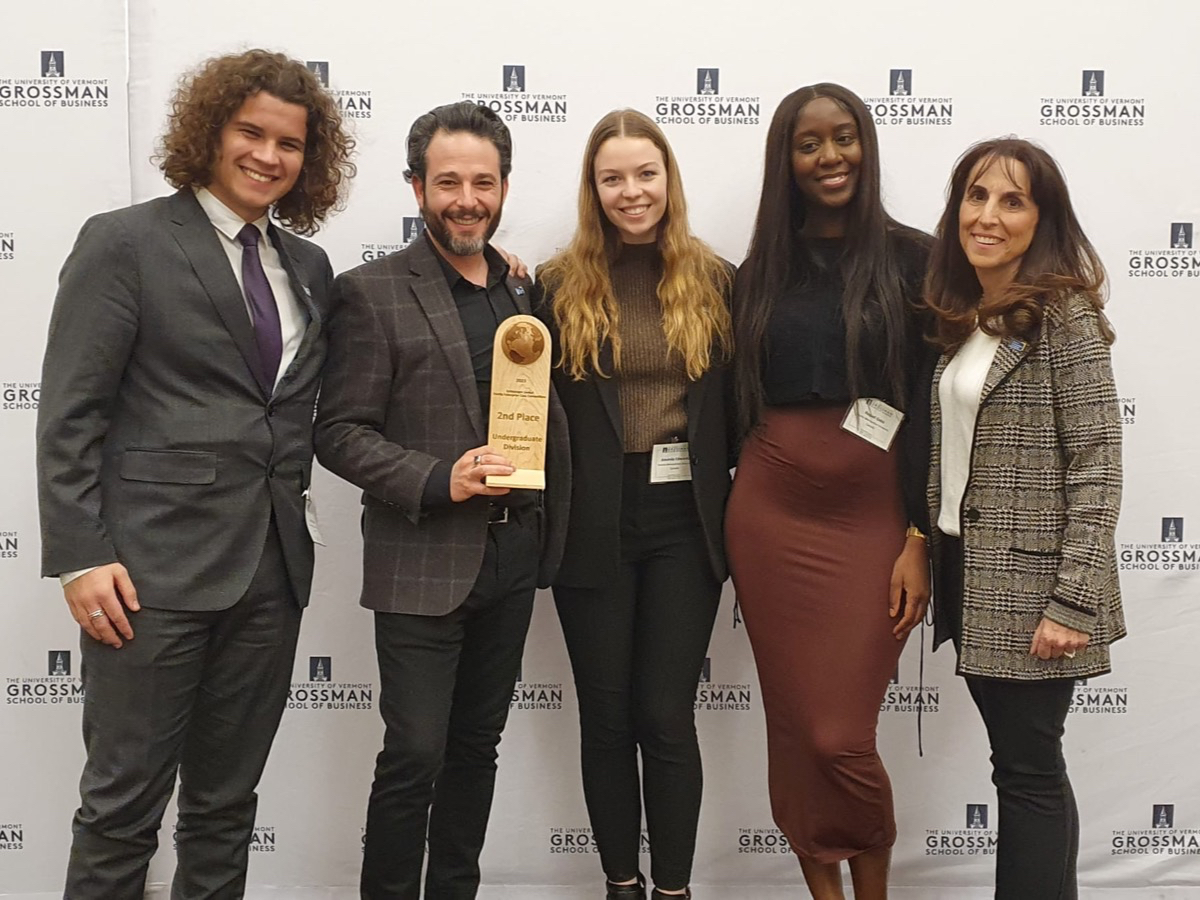Advice for case competitions from students studying family business

The team at the case competition, hosted at the University of Vermont (From Left to Right: Jack Verster, Frank Barbera, Amanda Edwards, Raquel Goka and Janie Goldstein)
Three Ted Rogers students won second prize in the undergraduate division at the Schlesinger Global Family Enterprise Case Competition (SG-FECC) in January. They were one of 19 teams from 12 countries and four continents. Students Raquel Goka, Jack Verster and Amanda Edwards were selected to attend the competition. They left with tips and advice for other students attending future case competitions.
Amanda shared her thoughts about the experience:
“Starting the year at the four-day Schlesinger Global Family Enterprise Case Competition (SG-FECC) was a positive experience that I hope will set the tone for the year to come. At an international level, our team, representing Toronto Metropolitan University, had the opportunity to network, compete and challenge ourselves daily. What started in the classroom as completing case studies for grades became recognition at a well-known and respected competition. It was a gratifying moment when our group was announced and called to the stage to receive our second-place title, but I truly believe it was the moments following our finalist presentation that was the highlight.
After three busy days of waking up early and spending hours at a time in a room together, hashing out a jammed-packed 20-minute presentation, we set the stage to present our final case to five judges, a large crowd and a live stream. Personally, it was nerve-racking, and there was a lot of pressure going into it. However, I walked out feeling as though it was our best presentation yet. We hit all the marks we discussed throughout our planning session– without a single practice run! We thought it through and left it all out on the table for the judges' review. If they felt we might have missed anything, we were able to cover it in the Q&A and prove that everything throughout the presentation was intentional. When we walked out of the presentation room, one of my teammates said ‘How can you not be happy with that?’ and he was right. That is not to say it wasn’t extremely exciting when they announced our name at the awards ceremony, but it was just validating how happy we all were with our efforts earlier that day.”
Raquel and Jack compiled a list of tips and tricks for other students attending future case studies:
- Going into any competition can be very nerve wracking and stressful but remember that beside the contest it’s an experience! Get excited for the amazing experience! Not only is it a chance to travel, but it is also an opportunity to really push yourself.
- Practice, practice, practice. Go over your powerpoint skills– this will pay off! Rehearse in person to help with group dynamics as well as realistically prepare you for the actual work environment of the competition. Think about what you perceive when someone else is presenting, whether that’s projecting your voice, smiling, being personable, etc., and keep these things in mind. It is a contest and your presentation style is half of the work.
- Be confident. Make sure you feel confident and be conscious of your body language when practicing. This includes during networking as well. This is your opportunity to shine and connect with students internationally and academics.
- Be intentional. If you're going to make bold and striking recommendations, lean into it. If you’re going to choose a specific aesthetic, lean into it. No matter what, always make it clear that you made this particular decision with intention.
- Sharpen your skill in case analysis. Cases can be filled with a lot of information which may feel overwhelming. However, following a 4 step system helps to pull out relevant information. This consists of reading the case, understanding the family and business problems and pulling out important information to solve the problem. By breaking down the case into these 4 sections, you will become a pro in case analysis.
Francesco Barbera, an Associate Professor of Entrepreneurship and Strategy at TRSM, served as coach to the team, alongside Janie Goldstein, a Contract Lecturer. Francesco commented that the outcome “establishes the Ted Rogers School of Management as a global player in the family business education space...and is a sign of things to come.”
Congratulations to the team!